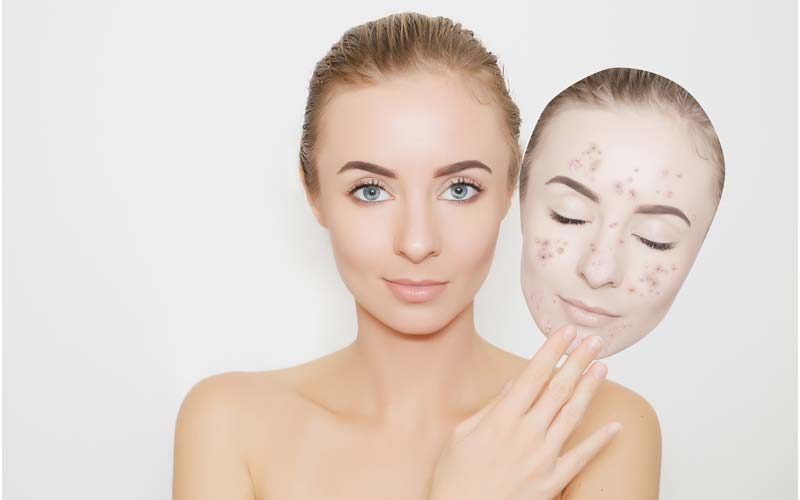Cystic acne is a common concern for many people. Though it is not verysubtle in how it presents itself, it can creep up out of nowhere especially for someone who has been living with acne for most of their life.
Acne is a very common skin condition that is also usually a sign of sign of many underlying problems within the body-hormonal changes, lack of water, poor dental hygiene, improper diet, even pregnancy. However, when those pimples turn into more aggressive, deep, painful boils, then this can become problematic.
Like all other forms of acne, cystic acne is a chronic inflammatory condition in which nodules appear on the face, neck, upper arms, back and shoulders. Sometimes blackheads, pustules, whiteheads form deep within the skin to form cystic acne.
According to the American Academy of Dermatology, acne affects about 50 million Americans each year. Though acne is generally not harmful, it can cause deep physical and emotional wounds if left untreated. Because acne tends to form in stages, it is important to get the best treatment necessary at the onset.
What Causes Cystic Acne?
Acne forms when hair follicles become clogged with dead skin and natural oils that secretes from the body, called sebum. Cystic acne, being a more severe form of the former, affects many young adults. Unlike other forms of acne, due to the severity of the condition, it can cause pain and greatly impacts the face, compared to the rest of the body.
Cystic acne is typically caused by blocked pores,, which can lead to an infection, if left untreated. If allowed, bacteria, known as anaerobic bacterium can build up on the skin. Eventually comedowns, or blackheads develop and once they are infected, cysts form. If cysts are aggravated or scratched, this can spread matter onto other parts of the face, spreading the acne.
What Are The Symptoms Of Cystic Acne?
While there isn’t a true way to measure severity of acne, practitioners use grades, I –IV to classify the skin condition. These grades are usually just mild, moderate and severe. Cystic acne, generally being the most painful, can also be mild to moderate as well. Common characteristics of cystic acne include
Nodules – A swelling of cells in the skin
Papules – Raised, solid, swelling that forms on the skin.
Pustules – A blister or pimple which contains pus.
Cysts – A cavity found in the skin, containing fluid.
Cystic acne is easily diagnosable. Generally, the condition can produce permanent damage if you try to handle on your own. Abrasive scrubs, picking and popping can cause unsightly damage that renders irreversible. For this very reason, it is important to seek a dermatologist to find the best care possible. Results of incorrectly handling cystic acne include
- Large pores and pits
- Ice pick scars
- Raised, red scars
Treating Cystic Acne
Acne Treatment for Sensitive Skin comes in a variety of forms. Treating cystic Acne with over the oral medication is one way to go if you suffer from painful and inflamed conditions. Medication taken orally helps to quell bacteria and bring balance back to the skin. Common medications such as ©Accutane and ©Claravis help to kill of acne-causing bacteria and may be prescribed by your doctor if cases prove severe enough.
Additionally, options for treating cystic acne come in the form of lotions, creams and gels. If you have cystic acne and wish to treat it topically, here are some ingredients to look out for, which will help quell inflammation and redness.
AHA’s or Alpha Hydroxy Acids – sloughs off dead skin to reveal fresher, clearer, more radiant skin.
Clay – Helps Absorb oils and draw toxins out of the skin.
Salicylic acid – Reduces oiliness and redness. Also dissolves dead skin cells.
Azelaic acid – Clears lesions and swelling due to rosacea.
Sulfur – Sometimes taken orally and can also be used topically to shed excessive skin and kill acne-causing bacteria.
Tea Tree Oil– Renown for its antiseptic properties, helps to kill bacterial and fungal infections.
Cystic acne can be a pain to deal with but it doesn’t have to ruin your life. Whether your acne is mild, moderate or severe, treatment if available for those who suffer from the condition. As with all over the counter medications and products, it is best to talk to a dermatologist about the best method of quelling cystic acne so you can get on to being a more vibrant you.










Comments are closed.